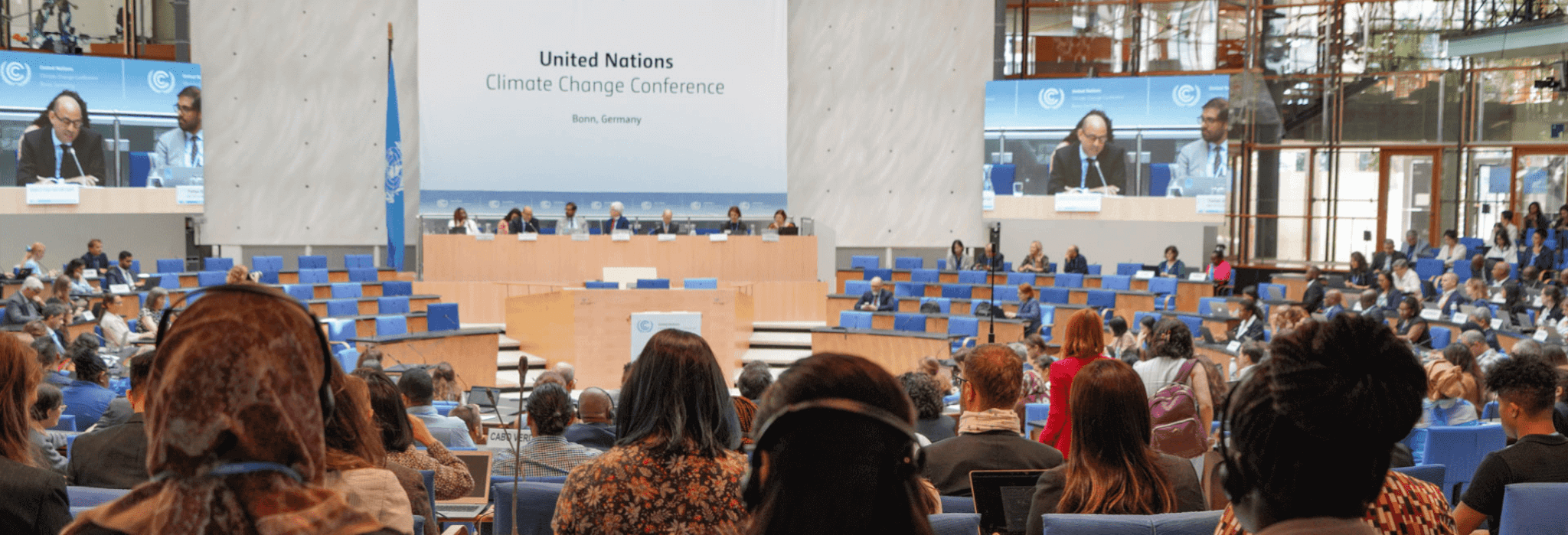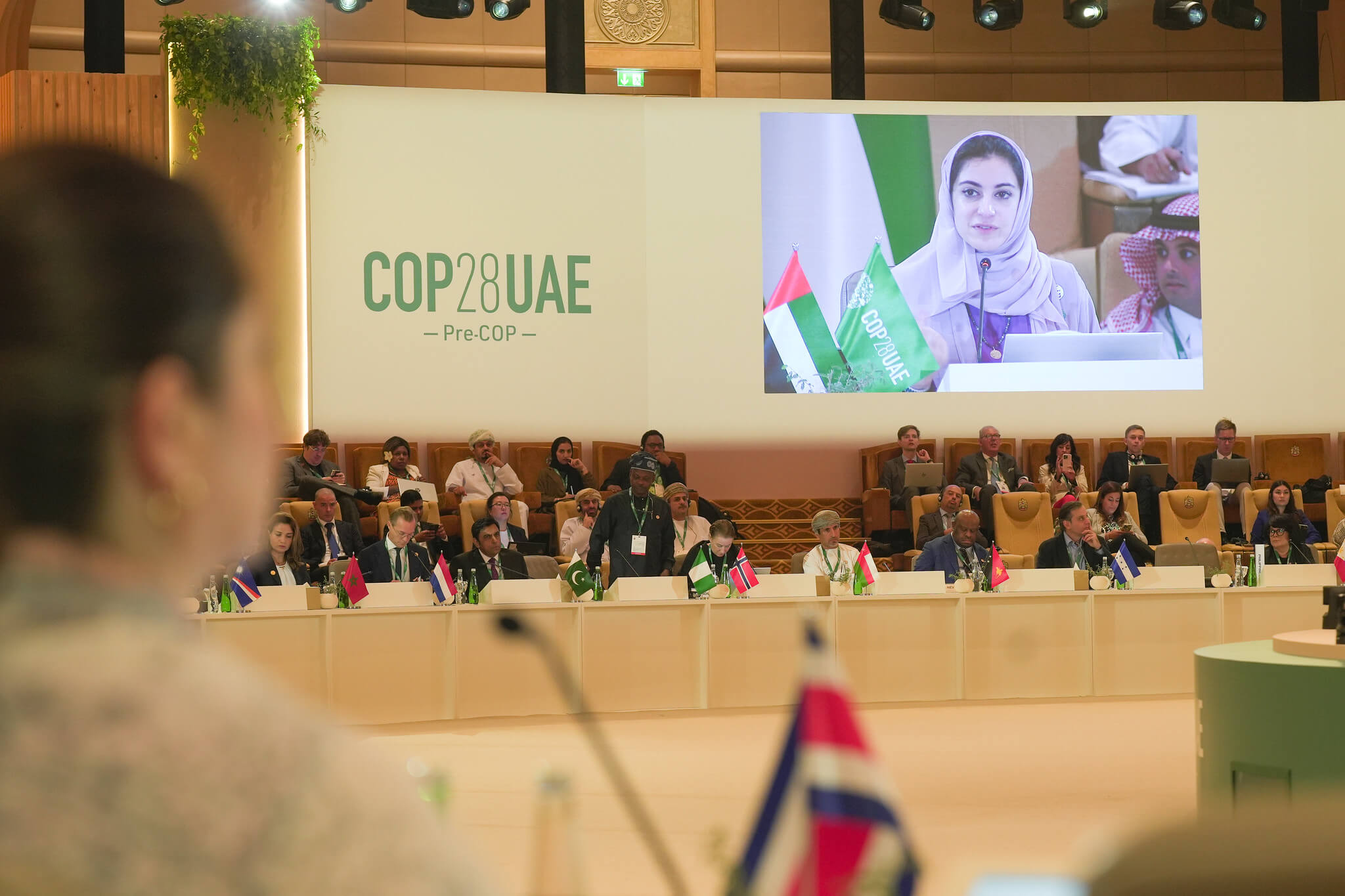
Last week, the United Nations Framework Convention on Climate Change (UNFCCC) published the Technical Synthesis Report for the world’s first Global Stocktake. This report is a milestone for assessing global progress on climate eight years after the Paris Agreement, paving the way for one of the most critical accountability moments for climate to date come December at COP28. World leaders must now take the results from this report and translate them into bolder and transformative action to cut emissions, build resilience, and boost climate finance.
“The Global Stocktake report stands as a candid reflection of our current climate crisis — leaving no room for excuses or delays,” said Jamal Srouji at the World Resources Institute. “Countries, cities, CEOs, and communities must rise to the occasion and build upon the foundation laid by the Stocktake.”
iGST’s Topline Takeaways
The Technical Synthesis Report identifies the course corrections needed to get climate action on track and avoid the worst outcomes of climate change. In order to execute this pivot, governments must now take the findings from this report and respond with ambitious new climate commitments at COP28.
“How well are we doing? Not well at all – the science makes this clear, as do the fires and the storms. And is the stocktake delivering results that help us do better?” said Tom Athanasiou at EcoEquity. “We’ll see soon, for with today’s report the technical phase of the first Global Stocktake is complete, and the ball has been handed to the world’s governments for the political phase. The question now is if they’re going to rise to the occasion.”
Our partners have outlined what the world can do next to ensure COP28 deliberations result in a clear and ambitious roadmap for course-correction. Chief among their reflections on the Technical Synthesis Report are:
- The need for governments to rise to the occasion and use COP28 to launch a coordinated response with commitments to reduce emissions, increase resilience to the impacts of climate change, and adequately finance the transition.
- The need for the private sector to scale investments aimed at ending fossil fuel use, building clean energy capacity, and protecting and preserving our natural environment.
- The need for the world to recognize this pivotal climate milestone as an opportunity to reinvigorate the spirit of globally coordinated, equitable, and intersectional climate action.
Topline findings in line with the goals of the Paris Agreement – and the five priority areas identified by the independent Global Stocktake (iGST) – include:
Adaptation
As we see increasing temperatures and accelerating natural disasters, more adaptation is “urgently needed…particularly for those who are least prepared for change and least able to recover from disasters.” However, existing adaptation plans are “fragmented, incremental, sector-specific and unequally distributed across regions,” and funding and support must be “rapidly scaled up” to meet adaptation and loss and damage needs.
Key adaptation takeaways from the report include:
- Funding and other support for adaptation and loss and damage, including innovative and novel sources of finance, must be rapidly scaled up to meet the urgent and increasing needs.
- Actions to increase adaptation and avert and minimize loss and damage must be enhanced, particularly in countries that are most vulnerable and least able to recover from climate events.
- Adaptation plans must be tailored to local contexts, populations, and priorities.
- Transparent reporting on adaptation is needed to help actors understand, implement, and cooperate on their adaptation strategies.
Finance
The effective deployment of at-scale finance, particularly in low-income countries, requires holistic reform, including scaled up public finance and regulatory shifts to redirect private finance toward climate solutions.
“We have to grasp the opportunity in the Global Stocktake to look at the financing of climate action holistically,” stated Charlene Watson at ODI. “We must use the Stocktake to send strong messages to the actors that shape these flows, whether public or private and domestic or international, or we risk a mismatch between the mosaic of routes to finance mitigation, adaptation and loss and damage with the goals of the Paris Agreement.”
Key finance takeaways from the report include:
- International public finance needs to be rapidly scaled and strategically deployed to meet urgent needs.
- Systemic reform can unlock finance and investments for climate action in line with low-emission and climate-resilient development.
- Significant finance, including from public sources, continues to be directed toward high emission sectors. This must be efficiently shifted towards climate action at scale.
- Regulations and policies must be in place to incentivize investments that transform the global financial system.
Mitigation
Simply put, we are not currently on track to achieve the temperature goals of the Paris Agreement, even with perfect implementation of current Nationally Determined Contributions. Parties must act urgently to course-correct, including scaling up renewables, phasing out fossil fuels, and engaging in systems transformations.
Key mitigation takeaways from the report include:
- The science is clear—we must urgently phase out unabated fossil fuels, scale up renewable energy, and protect and restore nature.
- We have proven and cost-effective technologies available today that can cut our emissions nearly in half by 2030.
- Countries must increase the ambition of their climate pledges while also doing more to ensure that the pledges are implemented through robust policy, adequate financing, and transparent reporting.
- Climate action is a job creator. In a just energy transition, 3.5 times more jobs could be created than lost by 2030. Mitigation approaches that also deliver sustainable development and a just transition can and should be prioritized across jurisdictions.
Equity
A focus on equity and inclusion will drive ambition in both climate action and support. Those most affected by climate impacts must be at the center of climate solutions.
“The Stocktake is crucial for climate-vulnerable countries in regions such as Southeast Asia to survive and thrive amid the climate crisis,” said Danica Marie Supnet at the Institute for Climate and Sustainable Cities. “Its outcomes can elevate accountability and put significant pressure on governments to enhance national targets in support of the Paris Agreement’s collective goals.”
Key equity takeaways from the report include:
- Equity is core to the Paris Agreement ambition and its urgency should be emphasized accordingly.
- The rapid and systemic transformations the climate emergency requires will have distributional impacts. Equity and inclusion are non-negotiable aspects of climate planning.
- Sustainable development and poverty alleviation should inform mitigation pathways.
- In line with their respective capacities and historic responsibilities, high-income countries must take the lead in providing public finance and support to underpin climate transitions.
- While the Global Stocktake is a Party-driven process, non-Party stakeholders including Indigenous peoples, local communities, and civil society representing communities often left out in climate action, such as women and youth, are critical to strengthening climate responses.
Implementation
There is a clear need for urgent action and support to accelerate implementation across all sectors and systems, in order to make progress towards the Paris Agreement and rapidly respond to the climate crisis.
Key implementation takeaways from the report include:
- Accountability and transparency mechanisms, including opportunities to learn from transparent reporting on progress and lessons learned, are core to implementation and should be prioritized alongside other climate action.
- Clean technologies need to be rapidly deployed and the innovation, development, and sharing of new technologies is core to supporting developing countries.
- Systems transformations are needed across sectors and contexts to achieve net zero, including:
- Scaling renewable energy
- Phasing out all unabated fossil fuels
- Halting deforestation
- Reducing harmful emissions beyond CO2
- Implementing measures to decarbonize both the supply and demand side of economies
As we now look to the conclusion of the first Global Stocktake, with countries deciding on their collective response plan at COP28, we urge leaders to take bold and brave actions in line with the urgency this moment demands.
“The outcome of the first Global Stocktake serves as a roadmap for climate action in this critical decade and beyond,” said Akibi Tsukui with the Institute for Global Environmental Strategies.“Non-state actors are the ones who implement this roadmap on the ground, standing ready to collaborate with governments who update and enhance their Nationally Determined Contributions.”
What’s Next in the Stocktake Process?
It is paramount that leaders take this opportunity for course-correction. While the technical report outlines the depth of shifts needed to achieve a climate-safe future, the Stocktake’s third and final phase will serve as a platform for countries to designate a collaborative path forward. Leaders should make appropriate preparations in line with this ambition to maximize the opportunity of COP28 as a catalytic moment in the global response to climate change.
“The Global Stocktake report reaffirms that we need strong country-level commitments to curb emissions and implement adaptation measures while allowing every global citizen the chance to improve their lives in a rapidly changing climate,” said Mohau Mateyisi at the Council for Scientific and Industrial Research.
iGST member organizations call on world leaders to respond to the stark messages delivered in this first Global Stocktake, with decisive action at COP28 that guides us toward a safe and prosperous future for all. Learn more about the Global Stocktake here and iGST’s recommendations for priority actions at COP28, here.

